What Are Sustainable Agricultural Practices and Why Do They Matter?
Standing in my grandfather’s wheat field, I saw him care for the land with deep wisdom. His hands, worn from years of farming, taught me a key lesson. Farming is not just about growing crops; it’s about keeping our planet healthy.
Sustainable agricultural practices are a new way of farming that goes beyond old methods. They are detailed plans to protect our environment and ensure we have enough food. These practices aim to keep the ecosystem balanced, lessen harm to the environment, and make farming more resilient.
Exploring sustainable agriculture, you find a way to farm that cares for the earth and grows food. It includes saving soil and using smart water management. Sustainable farming offers a complete answer to today’s farming problems.
Key Takeaways
- Sustainable agriculture prioritizes environmental health and food production
- Practices aim to minimize ecological disruption while maintaining crop yields
- Integrates ecological principles with modern farming technologies
- Supports long-term agricultural sustainability and ecosystem preservation
- Provides innovative solutions to global food security challenges
Understanding the Foundations of Sustainable Agriculture
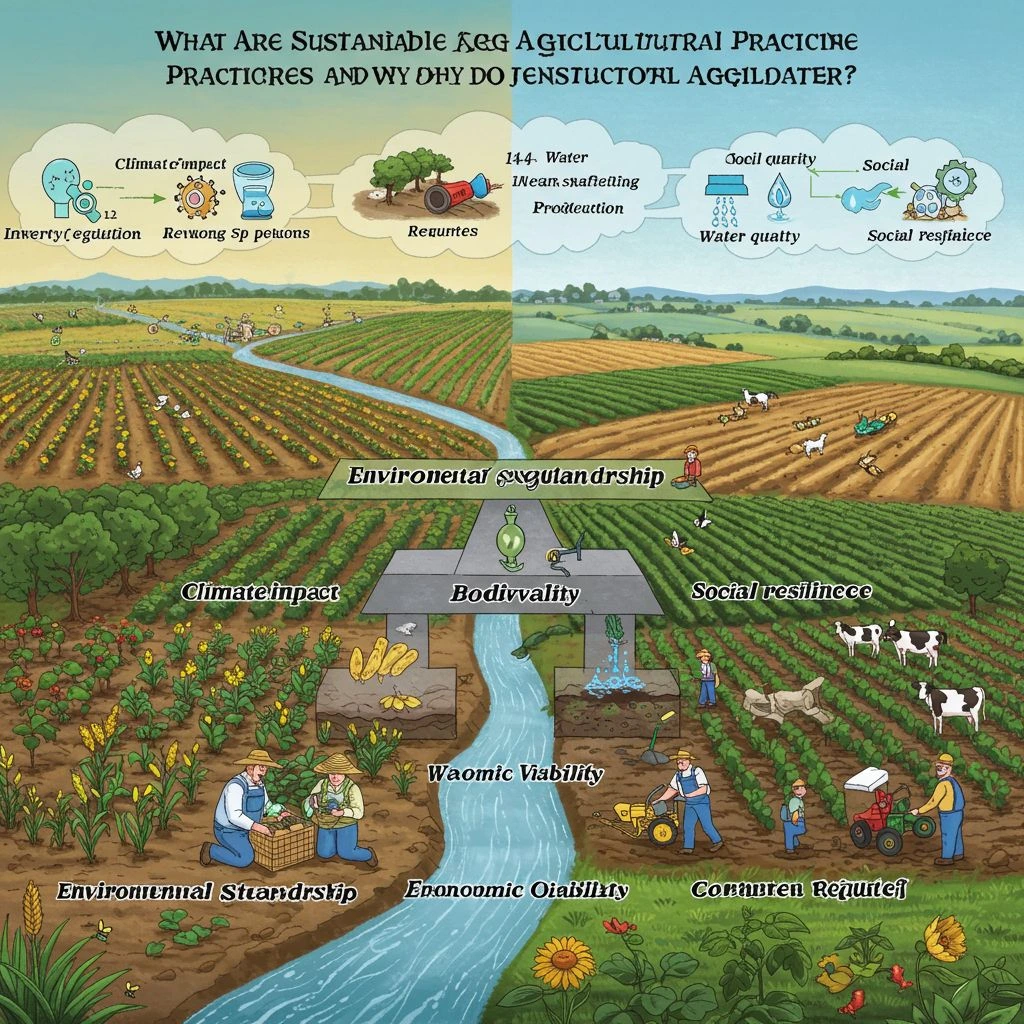
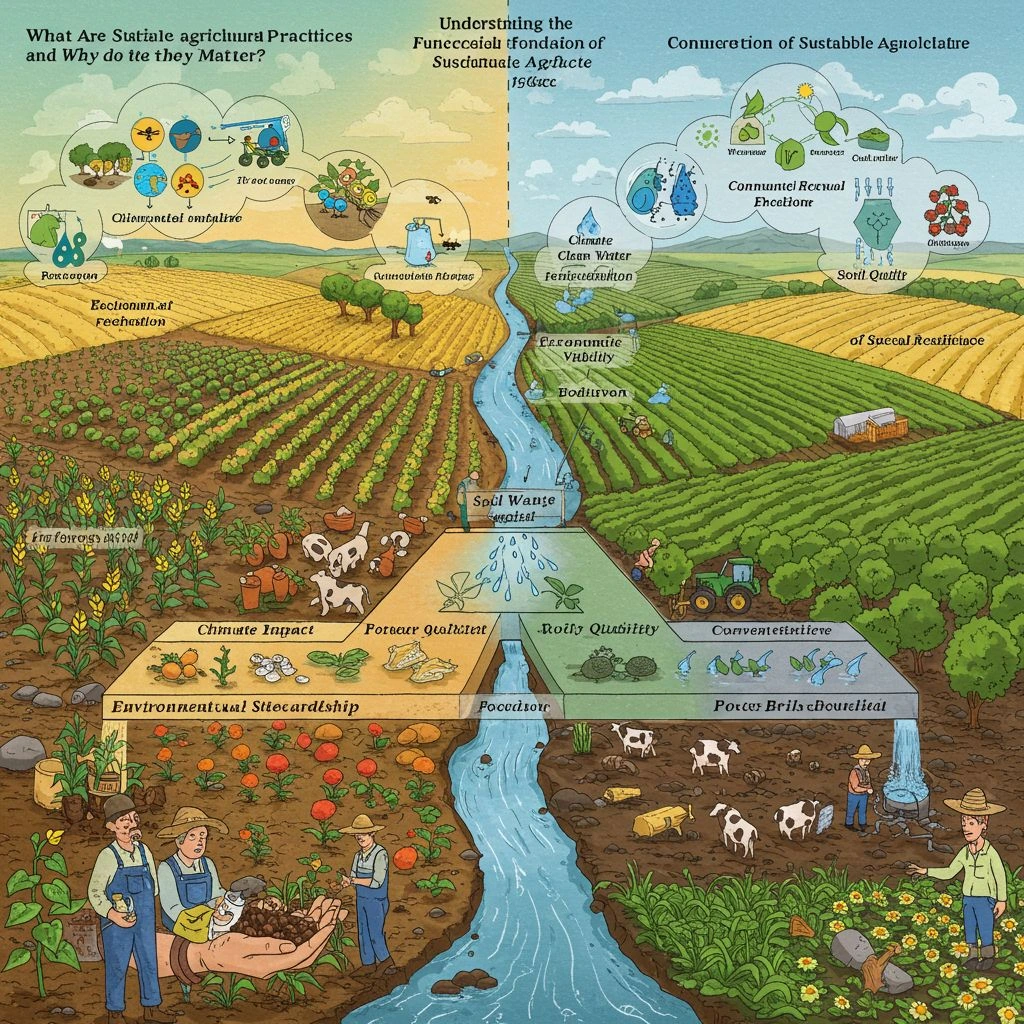
Sustainable agriculture is a way of farming that cares for the environment, makes money, and helps people. It’s a new way of growing food that’s different from old farming methods.
Historical Evolution of Agricultural Sustainability
The start of sustainable farming comes from ancient times. Farmers learned to work with nature, not against it. Important steps in this journey include:
- 1940s: Early talks on saving soil
- 1960s: More people started caring about the environment
- 1980s: Sustainable farming ideas began to form
- 2000s: The world started to see the value of sustainable agriculture
Key Principles of Sustainable Farming Methods
Sustainable farms follow key rules to protect the earth and keep farming strong. These main ideas are:
- Less harm to the environment
- Keeping nature’s variety alive
- Healthy soil
- Fewer chemicals used
The Triple Bottom Line Approach
Sustainable agriculture looks at three main areas:
- Environmental Sustainability: Saving natural resources
- Economic Viability: Making sure farmers can make a living
- Social Responsibility: Helping rural communities
By linking these areas, sustainable farms build a strong and flexible farming system. This system meets today’s needs without hurting tomorrow’s chances to grow food.
Environmental Benefits of Sustainable Agricultural Practices
Sustainable farming brings big wins for our planet. It changes how we grow food and care for land. This new way of farming offers strong solutions for our environment.
These practices have many benefits. They help the earth in big ways. Farmers who use sustainable methods see their land and crops improve in many ways.
- Soil health restoration through reduced chemical interventions
- Enhanced biodiversity protection
- Significant reduction in greenhouse gas emissions
- Improved water quality and conservation
Understanding how sustainable farming helps nature is key. It keeps soil from washing away and saves animal homes. It also makes farms strong against bad weather.
These farming methods also boost nature’s help. They keep pests away and support good bugs. This keeps the food we grow healthy and diverse.
Sustainable agriculture represents a holistic approach to food production that prioritizes environmental preservation and long-term ecological balance.
Another big plus is capturing carbon. Sustainable farms use smart land care to pull CO2 from the air. This helps fight climate change and gives us healthy food.
Sustainable farming shows how we can protect the earth and grow food at the same time. It’s a smart way to meet our needs and care for the planet.
Economic Advantages for Farmers Implementing Sustainable Methods
Sustainable agriculture helps farmers grow their wealth and stay financially strong. It lets them use new ways to make money that old farming methods can’t match.
When farmers choose sustainable farming, they find many ways to make more money. They use smart methods that help them make money for a long time.
Cost Reduction Through Resource Efficiency
Using sustainable farming cuts down on costs. Here are some ways to save money:
- Buying fewer chemicals
- Using less water with smart irrigation
- Lowering energy costs with green tech
- Keeping soil healthy to use less fertilizer
Market Premium for Sustainable Products
More people want to buy food that’s good for the planet. This means farmers can sell their eco-friendly products for more money. It’s a big reason to go green.
Long-term Financial Stability
Sustainable farming makes farmers’ money safer. It does this by:
- Using less outside help
- Getting more consistent crops
- Staying strong against bad weather and market changes
- Finding new ways to make money
By choosing sustainable farming, farmers can grow their wealth. They also help take care of the environment.
Soil Conservation and Management Techniques
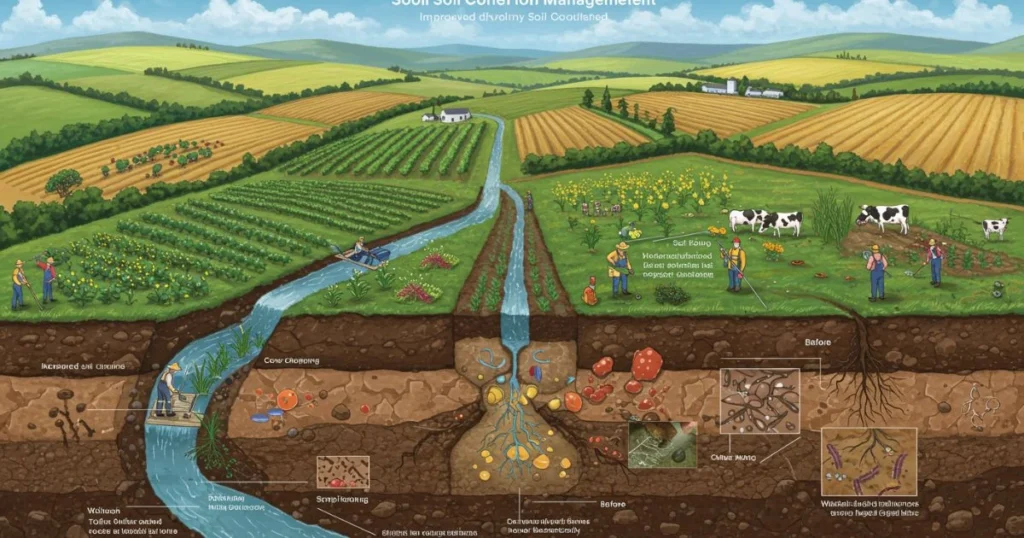
Sustainable farming depends on good soil management. Your farm’s success and health come from using advanced soil conservation methods. Healthy soil is key, supporting crops and keeping the environment balanced.
Important soil conservation strategies include:
- Conservation tillage that minimizes soil disturbance
- Strategic erosion control methods
- Comprehensive nutrient management systems
- Cover cropping to protect soil structure
Protecting your soil makes your farm strong. Sustainable farming keeps soil quality high. Reduced tillage saves soil structure, stops erosion, and helps plants.
Soil is not just dirt—it’s a living, breathing system that requires careful management and respect.
Using advanced soil management brings big benefits. You’ll see better water retention, higher crop yields, and less need for chemicals. Farms that focus on soil health are more productive and strong.
- Increases soil organic matter
- Enhances water infiltration
- Supports carbon sequestration
- Reduces agricultural runoff
Working on soil conservation is a smart move for your farm and the environment. By using these methods, you can make your farm more sustainable and productive.
Water Management and Conservation Strategies
Water is key in making farms sustainable. It’s vital to protect and manage water well. How you save water affects crops and the environment.
Today’s farms need new ways to handle water. This balance helps crops grow and saves resources. Saving water is good for the planet and your farm’s future.
Efficient Irrigation Systems
Using smart irrigation can change how your farm uses water. Here are some ways:
- Drip irrigation systems that save water
- Precision sprinkler technologies
- Soil moisture sensors for precise watering
Rainwater Harvesting Methods
Collecting rainwater is a great way for farms to have water. Good methods include:
- Rooftop collection systems
- Catchment basin designs
- Underground storage tanks
Water Quality Protection
Keeping water clean is important. Your farm should:
- Reduce chemical runoff
- Create buffer zones near water
- Use natural filters
By using these strategies, your farm will be better for the environment and more sustainable.
Crop Rotation and Diversification Benefits
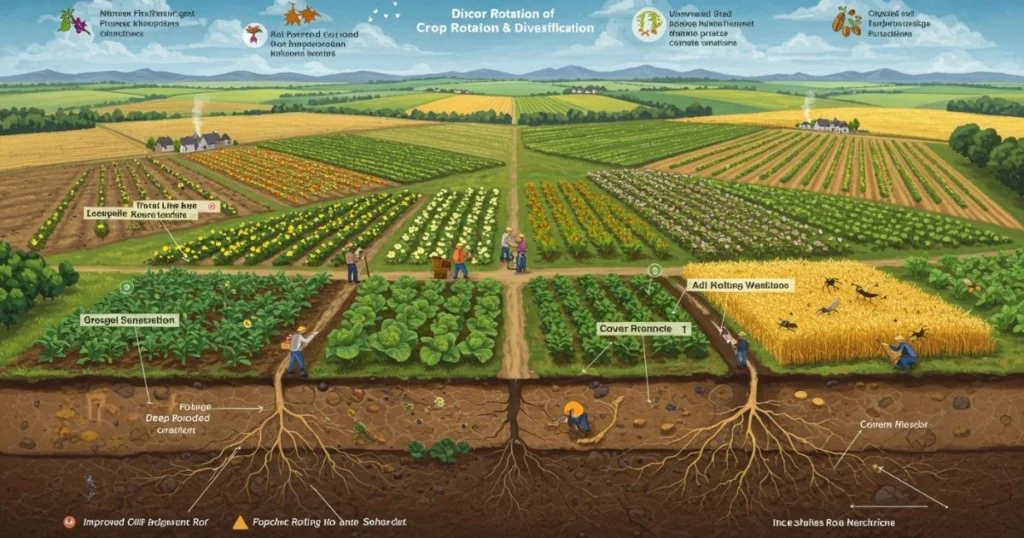
Sustainable farming uses crop rotation and diversification to keep farming ecosystems healthy. These methods make your farm strong, improve soil health, and lessen environmental harm.
Crop rotation brings many benefits. It helps by:
- Preventing soil nutrient loss
- Stopping pests and diseases
- Lowering the need for chemicals
- Improving soil quality
Diversification is more than just changing crops. Planting different crop varieties makes your farm more stable. It helps against weather changes and market ups and downs.
Diversifying crops also has big economic perks. Farmers who grow various crops can:
- Reach more markets
- Be less financially risky
- Make more money
- Keep their farm sustainable for longer
By adopting these practices, you change your farm into a flexible, eco-friendly system. It supports both the environment and your farm’s financial health.
Integrated Pest Management in Sustainable Farms
Sustainable agriculture needs new ways to control pests. This ensures crops and the environment stay safe. Integrated Pest Management (IPM) is a key strategy for sustainable farms. It helps manage pests without using too many chemicals.
IPM is all about understanding pests and finding eco-friendly solutions. Sustainable farms use a mix of methods. This way, they can tackle pest problems while keeping nature in balance.
Natural Pest Control Methods
Sustainable farms use natural ways to fight pests:
- Companion planting to keep pests away
- Using physical barriers like row covers
- Trap crops to draw pests from main crops
- Helping natural predators
Biological Control Agents
Biological control is a smart choice in sustainable farming. Farmers bring in good bugs to control pests:
- Ladybugs eat aphids
- Predatory mites fight spider mites
- Parasitic wasps target caterpillars
Prevention Strategies
Stopping pests before they start is key. Sustainable farms use:
- Keeping soil healthy
- Crop rotation
- Planting pest-resistant crops
- Regular field checks for pests
“In sustainable agriculture, prevention is always better than cure.” – Agricultural Sustainability Expert
With these methods, sustainable farms build strong, eco-friendly farms. They protect crops and reduce harm to the environment.
Renewable Energy Implementation in Agriculture
Renewable energy is changing how farms work in the United States. Now, farms use new ways to make energy. This cuts down on carbon emissions and helps farmers make money.
Solar energy is a big deal for farms. They’re putting up solar panels to power things like irrigation and farm tools. Solar panels bring many benefits:
- Lower energy bills
- Less pollution
- More money from energy sales
- Stronger farms
Wind turbines are also helping farms. They work well in open fields. Farmers use them to:
- Make electricity for the farm
- Earn extra money from selling energy
- Use less from the grid
“Renewable energy isn’t just an environmental choice—it’s a smart business strategy for modern agriculture,” says Dr. Sarah Johnson, sustainable agriculture expert.
Biogas is a new way to use energy on farms. It turns farm waste into energy. This helps the planet and the farmer’s wallet.
By using renewable energy, your farm can save money and help the planet. The future of farming is bright with these new technologies.
Building Soil Health Through Organic Matter Management
Sustainable farming is key to keeping soil healthy. Your farm’s success depends on managing organic matter well. By using smart organic matter techniques, you can make your farm a thriving place.
Composting Techniques
Composting is a great way to turn farm waste into valuable soil. Your composting plan can include:
- Kitchen and farm waste collection
- Proper carbon-to-nitrogen ratio management
- Regular turning and moisture control
- Vermicomposting using earthworms
Cover Cropping Benefits
Cover crops are vital for sustainable farming. They help your soil by:
- Preventing soil erosion
- Fixing nitrogen naturally
- Suppressing weed growth
- Improving soil structure
Minimal Tillage Practices
Less soil disturbance means better soil health. Sustainable agriculture keeps soil layers intact. This way, you improve soil health, cut erosion, and keep more organic matter.
Healthy soil is the foundation of productive and sustainable agriculture.
Technology’s Role in Agriculture Sustainability
Technology is changing how we farm, making it more sustainable. New tools help farmers use resources better and harm the environment less. Learning about these technologies can really help you understand sustainable farming.
Precision agriculture is a big step forward. It uses:
- GPS-guided machinery for precise field management
- Drone monitoring of crop health
- Satellite imaging for crop assessment
- Advanced soil sensors for nutrient tracking
Data analytics are key in modern farming. Farmers use advanced software to get insights on:
- Crop performance metrics
- Water usage optimization
- Predictive maintenance for agricultural equipment
- Climate change adaptation strategies
Remote sensing helps farmers make better choices. Advanced sensors spot problems early. This reduces waste and boosts farm output.
Technology transforms agriculture from a traditional practice to a data-driven, sustainable industry.
With smart tech, farms are getting better at being green and productive. The future of farming relies on new tech that keeps our planet and food safe.
Global Impact of Sustainable Agricultural Practices
Sustainable farming is changing how we grow food and protect the environment. It’s more than just farming; it’s solving big global problems.
By adopting sustainable farming, farmers and communities are tackling big global issues. They’re making a real difference.
Food Security Enhancement
Sustainable farming is key to a stronger food system worldwide. It helps farmers and communities develop strong farming plans. These plans:
- Boost crop yields
- Make farms less vulnerable to environmental changes
- Support local food production
Climate Change Mitigation
Farmers using sustainable methods are fighting climate change. Their efforts cut down greenhouse gas emissions. This is done through:
- Soil carbon sequestration
- Less use of chemical fertilizers
- Better ecosystem management
Biodiversity Conservation
Sustainable farming protects and boosts ecological diversity. Farmers keep natural habitats intact and reduce harmful practices. This helps preserve ecosystems and supports wildlife.
“Agriculture sustainability is not just about food production—it’s about creating a balanced, resilient global ecosystem.”
Conclusion
Sustainable agriculture is key to solving global environmental and food security issues. It involves using new farming methods to protect our planet’s ecosystems. This shift is not just about saving the environment. It’s about building strong food systems that help both people and nature.
You can make a big difference by supporting sustainable agriculture. You can do this by making smart food choices, backing local farmers, or pushing for green farming policies. Every step you take helps create a better future for our planet.
The future of farming relies on us working together for sustainability. As climate change and resource shortages grow, we need new farming ways. By supporting sustainable agriculture, you join a global effort to ensure food for all, now and in the future.
In the end, sustainable agriculture is more than farming. It’s about caring for our world. Your help can lead to big changes in how we grow food and protect our planet. Together, we can build a sustainable future for everyone.

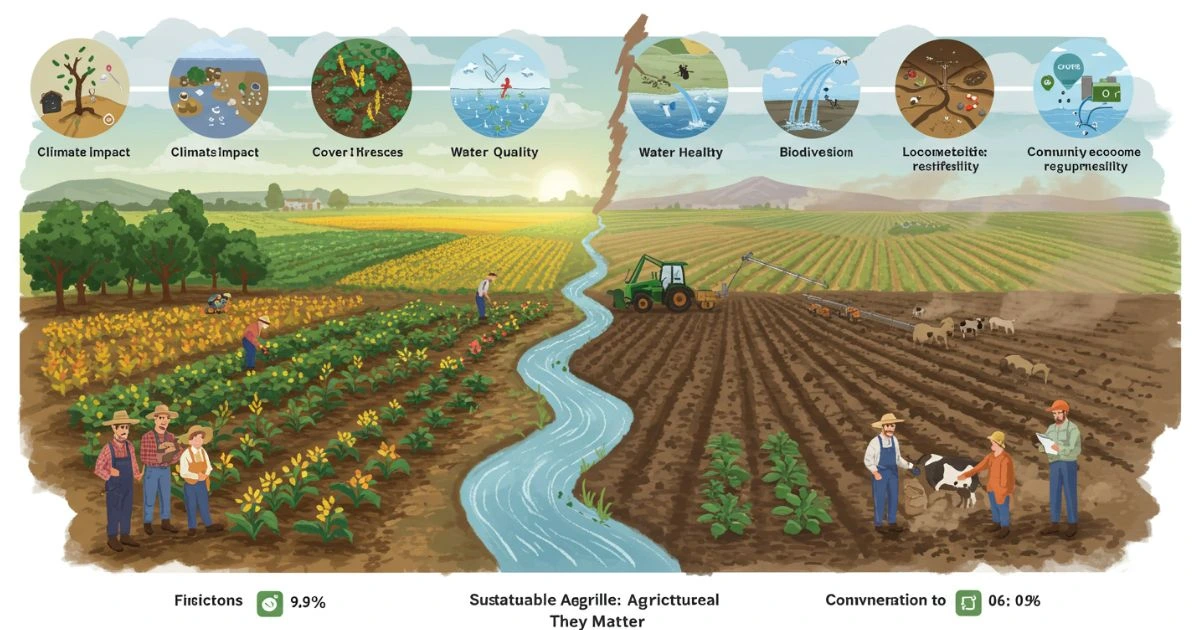
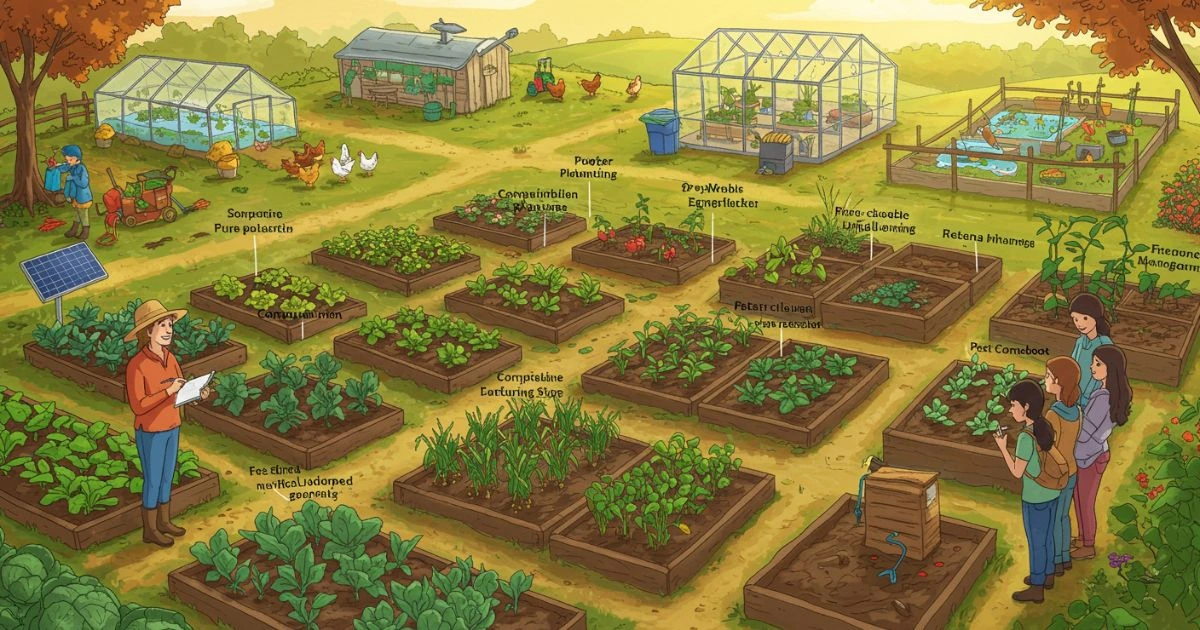
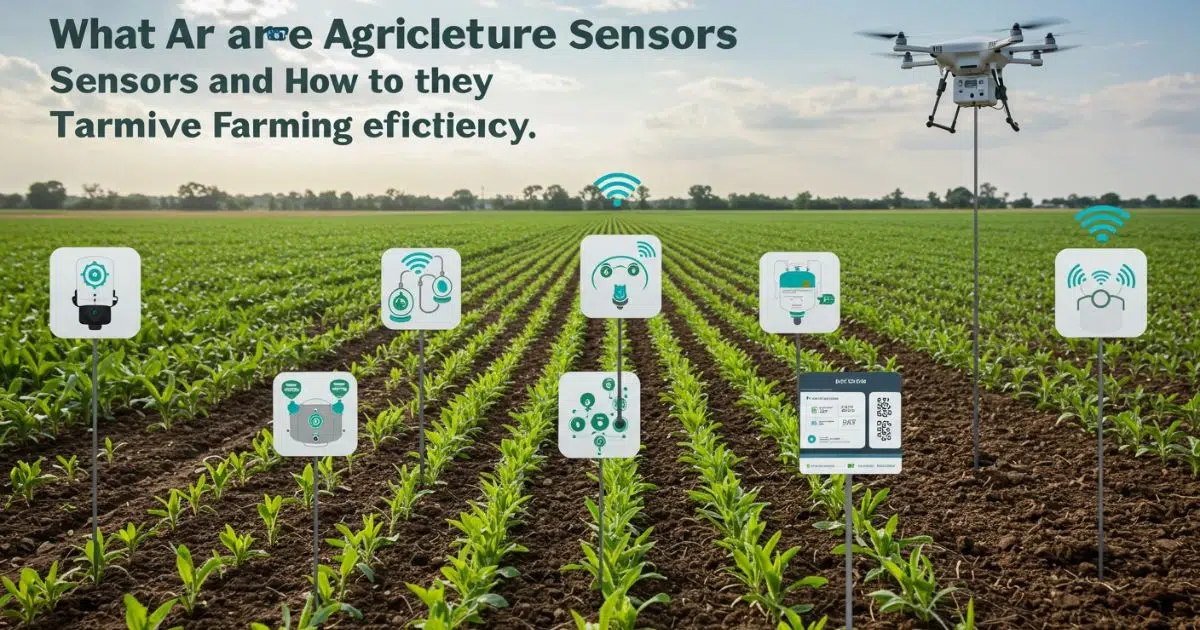
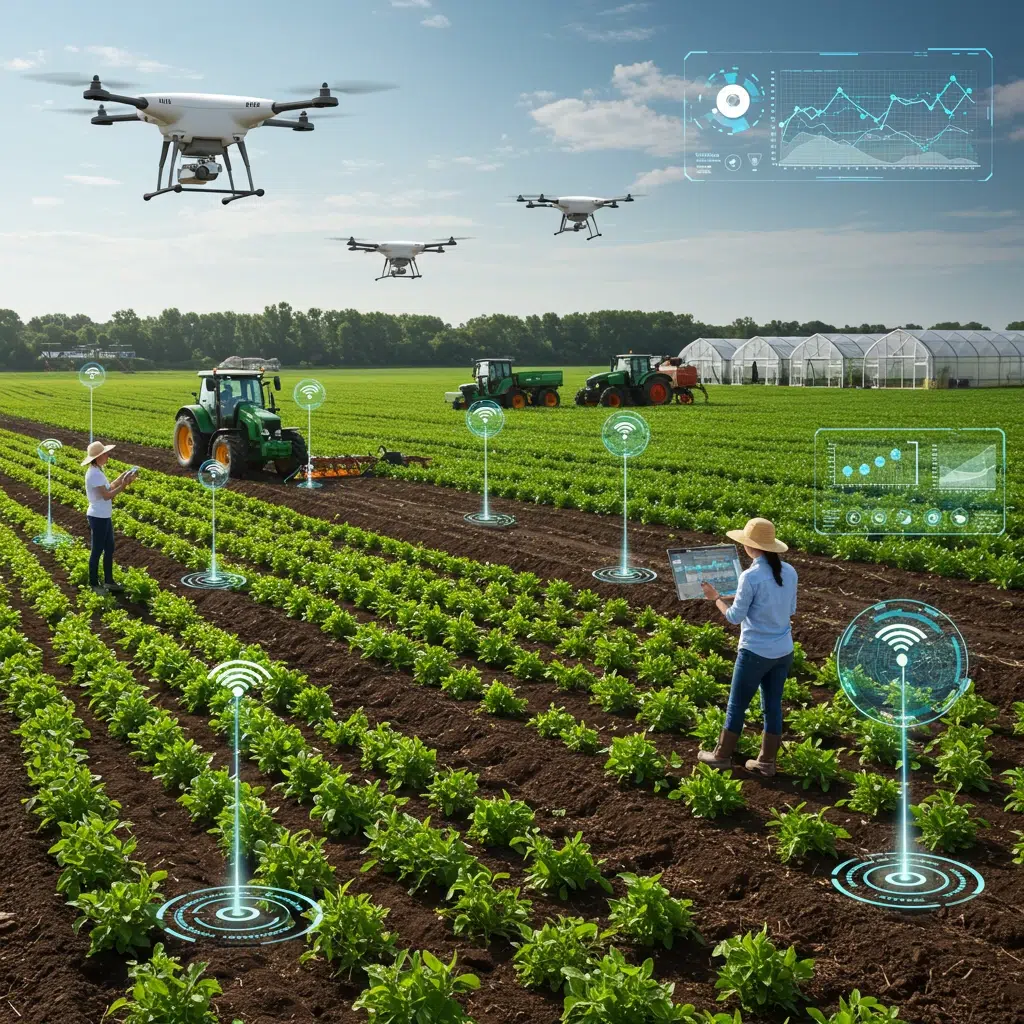
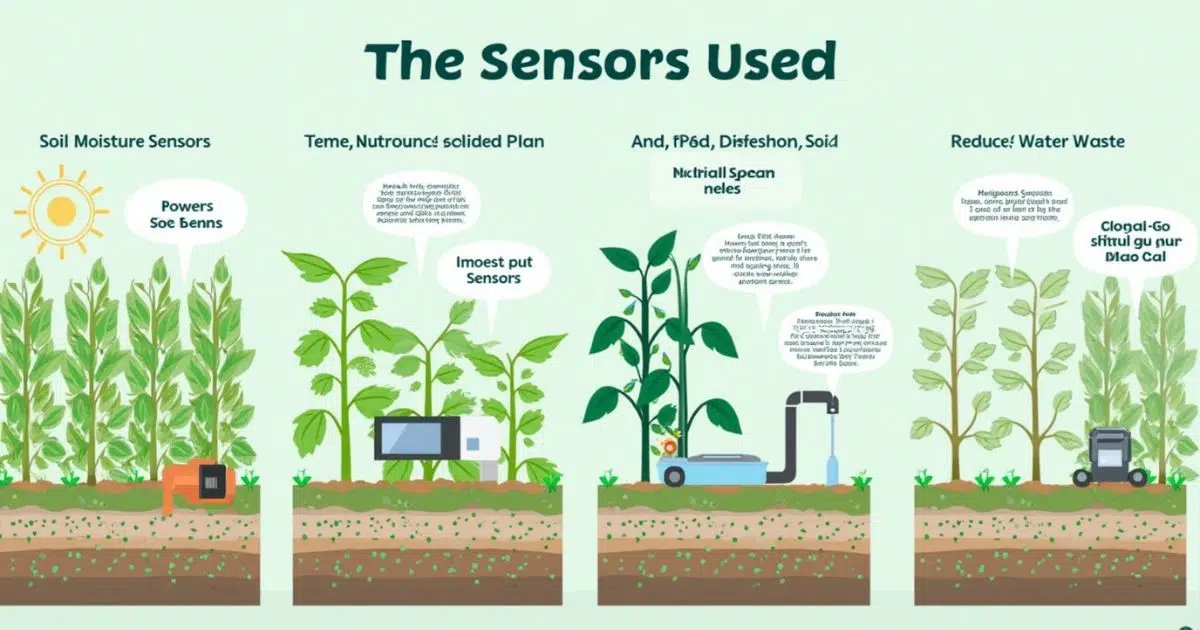
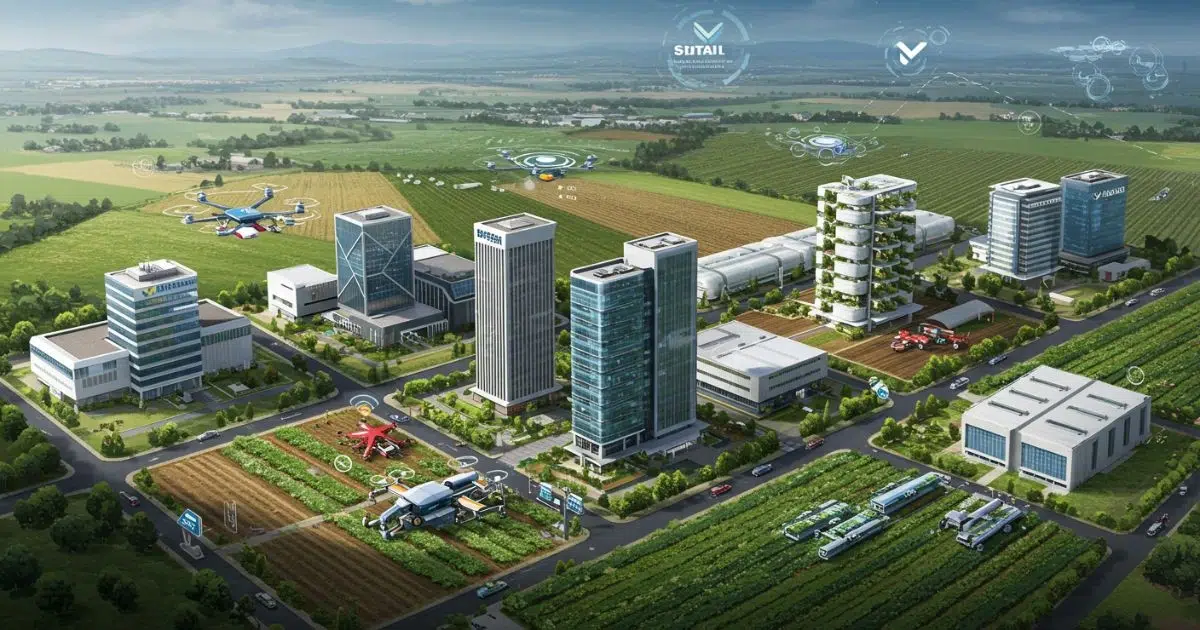
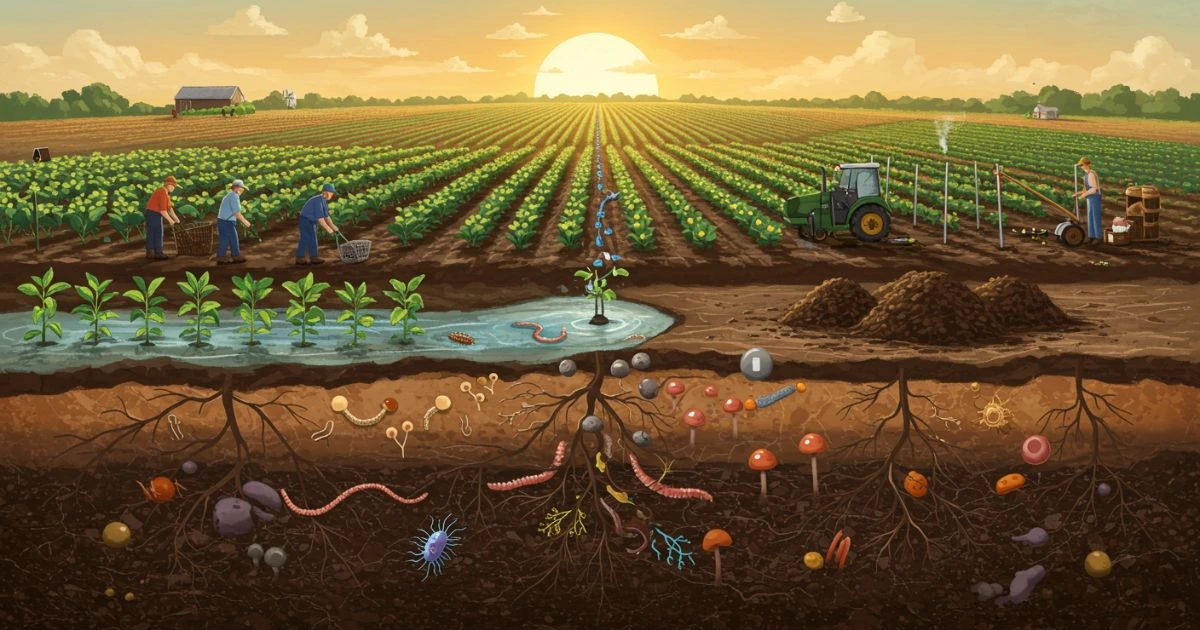
Leave a Reply